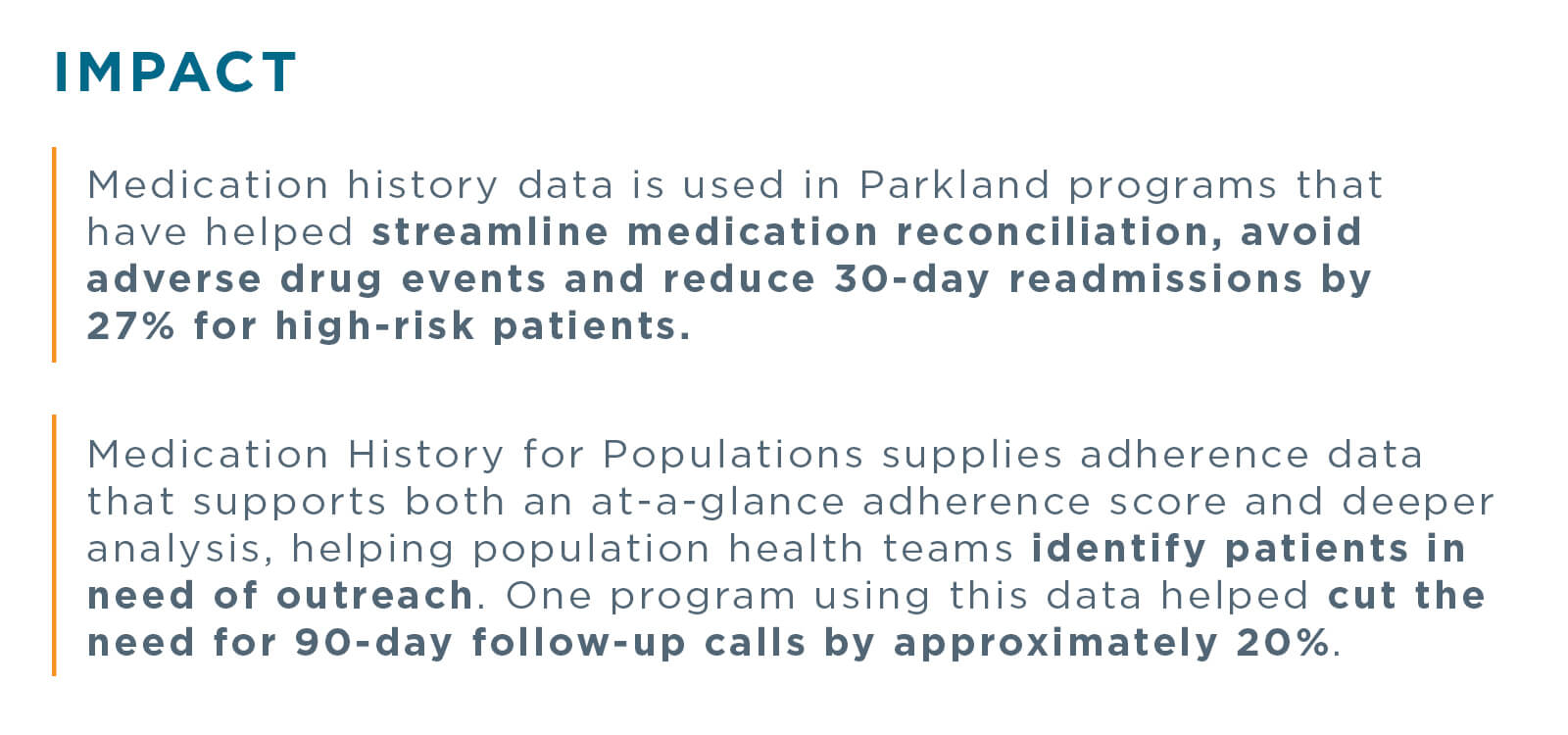Deep in the heart of Texas is Dallas-based Parkland Health & Hospital System, which has the country’s busiest emergency room and is one of the largest public safety net health systems. Primarily serving Dallas County and its highly mobile patient population comes with many challenges, but after going through the request for proposal (RFP) process, Parkland selected and implemented Surescripts Medication History and Medication History for Populations solutions with a twofold goal: Gain full visibility into patient medication activity at the point of hospital admission and help boost the efficiency and effectiveness of the system’s robust population health programs.
I recently talked with Rachel Petersen, Surescripts Manager of Product Innovation, about the particular hurdles this health system worked to overcome, and how our technologies helped their care teams move the needle in the right direction on key areas like medication adherence and hospital readmissions.
-
Q: What types of challenges does Parkland Health & Hospital System face when it comes to medication history?
A: Parkland’s patient population has diverse needs. And like so many Americans who struggle to afford their medications, Parkland’s patients may visit a few different pharmacies based on where they’re living at the moment, or where they can use coupons or pay a low cash price.
Social determinants of health aside, patients shouldn’t be expected to remember every detail of their medications, some of which may have come from outside the health system. When patients present for acute care, missing or inaccurate medication history information can pose a serious risk to the quality and cost of care, and most importantly, patient safety. The result can be adverse drug interactions, care gaps or other problems.
From a population health standpoint, without accurate adherence information, it was tough for Parkland to pinpoint which patients could truly benefit from an outreach. And in a value-based system, the lack of insight as to how well a patient is doing on their medication was negatively impacting reimbursements. So, like many hospitals and health systems around the country, Parkland was struggling to find information on prescriptions that had actually been filled outside the “walls” of their health system.
“We have so many different types of patients that come to Parkland—so they may not have insurance, but they may still be filling prescriptions ... [Medication History] helps the providers a lot, to see what they’ve been on or where they’ve been last and where they picked up medications”
Esther Thomas, Pharm.D
Parkland Health & Hospital System
-
Q: How does Parkland use the medication history that’s delivered to clinical and population health workflows?
A: One of the best things about medication history data is how incredibly versatile it is—but only if it’s comprehensive and accurate. Parkland uses this data for reconciliation, which can be arduous and prone to omissions when care teams only have access to in-house records, claims data or the patient’s memory. Nurses use it during intake, and pharmacists use it to handle more complex medication reconciliations.
For population health, this information gives a quick “snapshot” of medication adherence, which Parkland then uses to create custom metrics to inform population health teams. This helps them quickly zero in on which patients truly need intervention, rather than wasting time and effort reaching out to those who are already taking their medication as prescribed.
Gaining Full Visibility into Patients' Medication History
Medication History gives a more complete and accurate electronic picture of patients’ medication history for better informed, more efficient and safer care decisions.
Medication History for Populations lets health systems, hospitals and accountable care organizations proactively access medication history via their EHR or analytics platform to help manage cost-effective care for patient populations.
-
Q: What can you tell us about the results Parkland observed after implementing these Medication History solutions?
A: Their care teams felt more confident in their decision-making, patients experienced better outcomes, and there were substantial time savings across the system. Parkland uses medication history data to inform its PARADE program (Patients at High Risk for Adverse Drug Events) designed to flag patients at risk of adverse drug events for a consultation with a pharmacist.

For more lessons learned from Parkland, download the case study below. And see how Surescripts Medication History helps hospitals and health systems improve medication adherence and readmission rates.


 Dean Riggott Photography
Surescripts
Dean Riggott Photography
Surescripts






